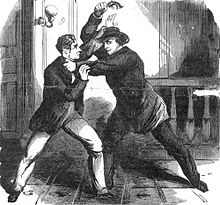Frederick W. Seward
Frederick William Seward (July 8, 1830 – April 25, 1915)[1] was an American politician and member of the Republican Party who served twice as the Assistant Secretary of State.
[4] On February 21, 1861, Seward arrived at the Continental Hotel in Philadelphia carrying a letter from his father for President-elect Lincoln.
The letter contained information gathered by Colonel Charles Pomeroy Stone and General Winfield Scott.
Stone had stationed three detectives from the New York police department in Baltimore, Maryland to gather information about plots against Lincoln.
Making his way by train from Illinois to Washington for his inauguration, Lincoln had intended to stop next at Baltimore, which was home to many secessionist sympathizers.
The warning Fred Seward brought would contribute to Lincoln's decision to pass through Baltimore under the cover of night, rather than stop and appear in public there.
He served in the position until 1869 and "assisted in the negotiations to the adoption of the Burlingame Treaty," which set the attitude towards China when the empire "accepted the principles of international law.
However, when the gun failed to fire, Powell quickly smashed the pistol over Frederick's head, causing several skull injuries.
Powell also injured a number of other bystanders, including Frederick's sister Fanny, his brother Augustus, his father's nurse Private George F. Robinson and messenger Emerick Hansell, but no one was killed.
Powell was hanged on July 7, 1865, along with David Herold, George Atzerodt, and Mary Surratt, who were also involved in the conspiracy.

